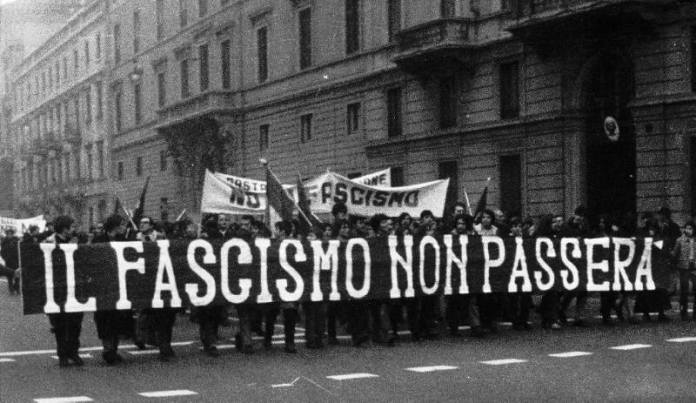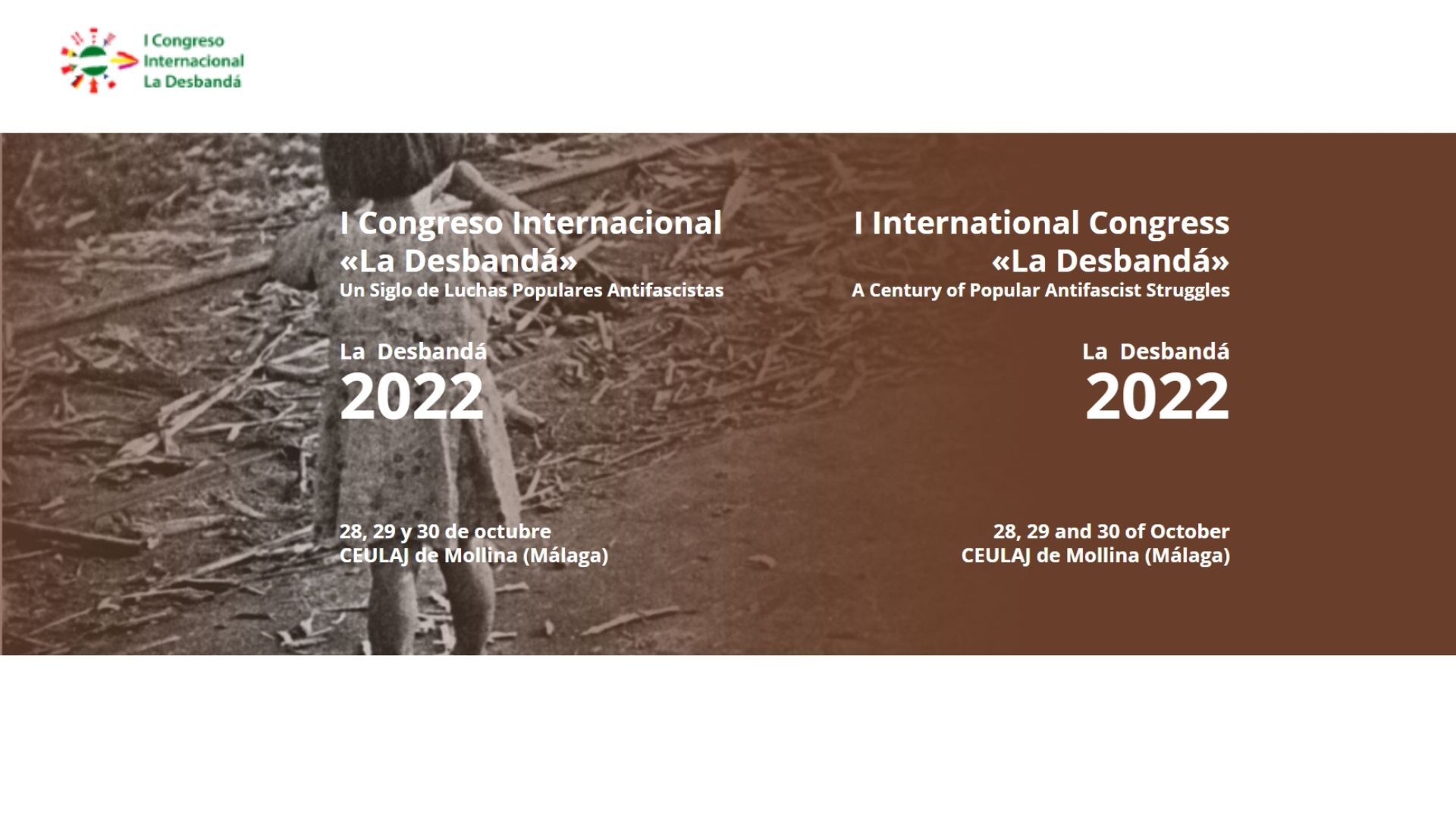- The city of Málaga (Spain) was the starting point of La Desbandá, the first mass flee motivated by the assault of Franco’s troops in 1937 and was a prologue of the atrocities that fascism brought to the European territory shortly after;
- The EUROM collaborates in the organization of this international congress organized by the association La desbandá with the aim to promote the debate on the historical meaning of this first attack of armed forces against a defenseless civilian population;
- The congress will take place in Málaga from October 28 to 30, 2022;
- The organizers offer 50 scholarships for volunteers to encourage the participation of youngsters and committed people.

The ASC La Desbandá was born with the commitment to organize and carry out public actions aimed at expanding social knowledge of the historical fact of the mass flight of civilians from Malaga to Almeria in February 1937, motivated by the entry of Franco’s troops into the city of Malaga, and to repair the memory of the victims of war crimes against humanity that Franco’s army perpetrated during the days that lasted the dramatic exodus.
The central axis of the activity of the Association consists of the preparation and execution, on an annual basis each February, of the Integral March of the Desbandá. Throughout several stages that follow the trail of blood and pain of the flight of 1937, the March combines the memorial struggle with the practice of hiking and the celebration of exhibitions, lectures, documentary screenings, recitals, and popular rallies.
In these times of health exceptionality and the rise of anti-democratic forces and ideologies, we consider it necessary to promote again the debate and the dissemination of what this first attack of armed forces against a defenseless civilian population meant historically, as a prologue of the atrocities that fascism brought to the European territory shortly after. To this end, at the International Meeting held in Vicar in November 2020, we presented the idea of the First International Congress on La Desbandá, A Century of Antifascist.
The call was made at the International Meeting held in Vicar in November 2020, within the Final Declaration and Manifesto that we launched to the entities and organizations that supported us and to the public opinion through the media, with the following statement: «We recognize that 83 years later little is still known about the war crimes and crimes against humanity committed against the civilian population during La Desbandá, so we convene this International Congress with the aim of achieving more truth, justice and reparation for the thousands of victims».
Proposal of objectives
Contents and communicative spaces
The scientific proposal that forms the basis of the First International Congress is articulated around the definition of three vertically related levels, from lesser to greater concreteness:
A) Aims and Objectives of the Congress. This level establishes the intentions, goals and perspectives of participation that constitute the working basis for the organisation of the Congress.
B) Themes and contents. These constitute the conceptual framework and the set of historiographical, social or legal questions that are raised according to the previously established objectives.
C) Spaces for communication and debate. As a projection of the proposed objectives and contents, we have defined a series of papers and round tables to address as far as possible the historiographical, humanitarian, gender, social, educational and legal dimensions of La Desbandá as a relevant episode in the Spanish War and as indisputable evidence of the genocidal practices of fascist militarism. In addition to this, there will be the presentation of papers related to the objectives and contents of the Congress, as well as the evaluations and proposals elaborated in an assembly in the final part of the Congress.

Blocks of objectives and contents
– To advance research and knowledge of the historical fact of the forced and massive flight of the Malaga and Andalusian population from Malaga to Almeria in February 1937 from different approaches and perspectives (humanitarian, war, international, political, gender, and territorial).
– To make known at regional, state, European and global levels the war crimes and crimes against humanity perpetrated on the civilian population by Franco’s military forces and their international allies during the mass exodus to Almeria, thus promoting the significance of the disbandment as a great anti-fascist symbol of the Spanish war.
– To promote the incorporation into the public education system of the values and contents of the democratic memory through the academic knowledge of the disbanding, by means of the elaboration of didactic materials and the formation of working groups of teachers.
– To recover and interpret primary and secondary sources of different types (archival, bibliographic, iconic, audiovisual, journalistic, epistolary, etc.) that can gradually form the necessary center of interpretation of the disbanding.
– To study in-depth the fundamental role of women in the whole process of flight, struggle and resistance, health coverage, protection of victims, and movements of refugees that took place during the event and in the historical context of the disbanding.
– To open up lines of research on the other flight and to disband, establishing a close vision between the movements of the refugee population that took place in the Andalusian territory during the Spanish war.
– To strengthen the connection and networking with other European centers and collectives linked to the recovery of democratic memory and anti-fascist resistance.
– Establish relations between the historical dynamics of 20th-century militarism and the aggressions and armed conflicts of the present, from the perspective of geopolitical causes, forced population displacements, and humanitarian consequences.
Proposals for content and themes
Approaches, historical issues, and elements of the debate that could be the subject of papers, conferences, round tables or other communicative formats.
1.- The Desbandá as a historical event. State the question, the construction of a consistent and scientifically-based historiographical account.
2.- Civil War, Spanish War, or the first act of the world war. Ideological struggle, geopolitical scenario and the intervention of foreign powers in the context of the seizure of Malaga and the republican resistance.
3.- The human rights perspective. War Crimes and Crimes against Humanity in the Desbandá. The memory of the terror against the civilian population: Testimonies, primary sources and archaeological evidence.
After Almería, the Diaspora. Movements and destinations of the refugee population towards Europe and Africa.
5.- Women in the Desbandá. Social roles of gender and the role of women in the struggle and resistance, family survival, health and humanitarian assistance between Malaga and Almeria.
6.- The other flight and disbanding. The contextualization of the Flight from Malaga to Almeria within the dynamics of the civilian population fleeing to the Republican rearguard. The map of the mass displacements of 1936 from Huelva, Seville and Cordoba.
7.- The geographical setting as an explanatory key. Lines of flight, repressive episodes and attacks on the civilian population from the perspective of the structure of the territory and the communication axes in south-eastern Andalusia.
8.- Dissemination and school knowledge of the Desbandá. Presence of democratic contents and values related to this historical event in the classroom. School curricula, the role of teachers and the preparation of teaching materials.
9.- The construction of a democratic and anti-fascist memory in a European network. From Nuremberg to the Disbanding. A comparative view of public memory policies in the EU.
10.- The struggle of the memorial movement. History and future of the demands and the citizens’ struggle to recover and socialise the Memory of the Disbanding. What remains to be done.
11.- The legal framework. The Law of Democratic Memory of Andalusia and the new State Law of Memory in relation to the consolidation of the Desbandá as a great anti-fascist memorial in Europe.

